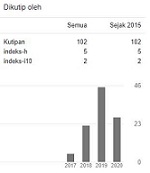Analysis of Students’ Reading Skill in English for the ICT Module: A Case Study of Informatics Students at Madura University
Abstract
Keywords
References
Abba, H. M., Mustapha, M. A., & Ali, H. (2019). Use of computer assisted instruction to improve students’ reading skill in English Language. i-manager’s Journal on English Language Teaching, 9(1), 32–37. https://doi.org/https://doi.org/10.26634/jelt.9.1.15294
Astuti, D. S., & Sari, D. S. (2021). Analisis kesulitan membaca teks Bahasa Inggris pada mahasiswa program studi pendidikan matematika. 10(2), 315–324. https://doi.org/10.31571/bahasa.v10i1.3270
Benmammar, S. (2020). Teaching English for specific purposes to computer science students with reading difficulties. Global Journal of Foreign Language Teaching, 10(4), 208–216. https://doi.org/10.18844/gjflt.v10i4.4889
Faidah, S. T. R., Sriyati, S., & Priyandoko, D. (2023). Development to train High School Students’ reading literacy skills. Jurnal Penelitian Pendidikan IPA, 9(8), 6045–6055. https://doi.org/10.29303/jppipa.v9i8.3763
Fauziati, E. (2016). Analisis pertanyaan pada butir soal reading comprehension pada test TOEIC. Jurnal Pendidikan Humaniora, 17(1), 9–22.
Fitria, R. A., Rukun, K., Irfan, D., Dewi, M., Susanti, R., Sefriani, R., & Rasmita. (2019). New literacy oriented ICT guidance module era of industrial revolution 4.0 in improving humanity literacy of students. International Journal of Scientific and Technology Research, 8(9), 1074–1078.
James, S. (2015). Finding your passion: Work and the authentic self. M/C Journal, 18(1). https://doi.org/https://doi.org/10.5204/mcj.954
Jarvis, H., & Pastuszka, L. (2008). Electronic literacy reading skills and the challenges for English for Academic Purposes. CALL-EJ Online, 10(1).
Karini, Z. (2019). The design of learning methods for reading comprehension. IJECA (International Journal of Education and Curriculum Application), 2(3), 10–15. https://doi.org/10.31764/ijeca.v2i3.2112
Marshall, C., & Rossman, G. . (2016). Designing qualitative research: Sixth edition. SAGE Publications, Inc.
Momo, L. L. (2022). Analisis Kebutuhan Bahasa Inggris untuk Mahasiswa Jurusan Teknik Informatika [Conference session]. Prosiding Seminar Nasional Sastra, Lingua, Dan Pembelajarannya (Salinga), 2(1), 1–8. https://doi.org/10.33503/salinga.v2i1.2184
Muslaini. (2017). Strategies for teaching reading comprehension. English Education Jurnal, 8(1), 66–77.
Nisa, B. (2017). Learning English reading skill through e-learning. Wanastra: Jurnal Bahasa dan Sastra, 9(2), 151–155. https://doi.org/10.31294/w.v9i2.2590
Noordan, M. N. H. bin, & Yunus, M. M. (2022). The integration of ICT in improving reading comprehension skills: A systematic literature review. Creative Education, 13(6), 2051–2069. https://doi.org/10.4236/ce.2022.136127
Obeka, N. O., Ngwoke, R. I., Okonkwo, F. A., & Ereke, J. S. (2022). Impact of Information and Computer Technology on students’ reading comprehension. Journal of Education
Volume 7, Nomor 2, Juli 2024
and Practice, 13(18), 132–139. https://doi.org/10.7176/jep/13-18-14
Pudyastuti, Z. E., Palandi, J. F., & Kom, M. (2014). A correlation between students’ english proficiency and their computer programming mastery. The 3rd UAD TEFL International Conference, 3(September 2014), 1219–1228.
Raju, T. S., & S.N.S.Sujatha, R. (2023). A study on impact of ICT in the Enhancement of English Language Skills among students. International Journal of Early Childhood Special Education, 14(9), 128–132. https://doi.org/10.48047/INTJECSE/V14I9.18
Somadyo, S. (2011). Strategi dan teknik pembelajaran membaca. Graha Ilmu.
Wahyuni, S. (2014). Peningkatan kemampuan membaca teks deskriptif dalam Bahasa Inggris dengan menggunakan sistematis cloze prosedur untuk siswa kelas X SMA Islam Al-Falah Kabupaten Aceh Besar. Visipena Journal, 5(2), 14–24. https://doi.org/10.46244/visipena.v5i2.255
Yin, R. K. (2018). Case study research and applications: Design and methods. In Journal of Hospitality & Tourism Research (Vol. 53, Nomor 5). https://doi.org/10.1177/109634809702100108
Yusuf, H. O., & Yakub, S. U. E.-. (2020). Impact of using ICT in teaching reading comprehension in secondary schools in Kaduna, Nigeria. 6(10), 320–329. https://doi.org/10.5281/zenodo.3736173
DOI: 10.53712/ellite.v7i2.2453
Refbacks
- There are currently no refbacks.







